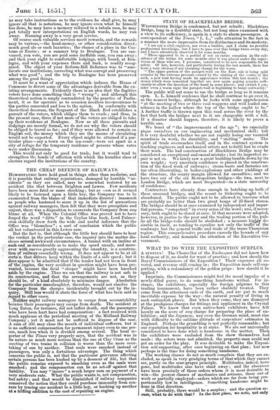STATE OF BLACKFRIARS BRIDGE.
WESTMINSTER Bridge is condemned, but not rebuilt ; Blackfriars Bridge, long in a doubtful state, but not long since examined with a view to its sufficiency, is again in a state to alarm passengers. A correspondent of the Times, "L. L," calls attention to the fact in a manner the more impressive from its distinctness and its modesty. " I am not a civil engineer, nor even a builder, and I claim no peculiar professional knowledge, but I have to pass over this bridge twice every day, and I have attentively observed it for some months.
" There appeared to be a partial if not an entire cessation in the sub- sidence of the bridge for Borne months after it was placed under the super- vision of those who are, I presume, considered to be now responsible for its safety. Of late, however, and particularly during the last month, there has been a very obvious if noealarming change for the worse. " The upper portion of the parapet-wall on the East side is being split asunder by the extreme pressure caused by the sinking of the centre of the arch, a new rent having made its appearance within this last month ; the stones which were cemented together are now again gaping asunder suffi- ciently to allow the insertion of the hand in some places ; and (which I con- sider even a worse sign) the parapet-wall is beginning to bulge outwardly."
The public will not cease to use the bridge so long as it remains open. L. L. himself confesses that he shall continue to go over it, as the nearest bridge, although he looks with some apprehension " at the meeting of two or three coal-waggons and well loaded om- nibuses in the hollow where the top of the bridge ought to be." A further traffic is thrown upon this road across the river by the fact that both the bridges next to it are chargeable with a toll. If a disaster should happen, therefore, it is likely to prove a terrible one.
We boast of " the improvements of the age "; we especially pique ourselves on our engineering and mechanical skill ; but it is very doubtful whether we are not rapidly losing our vaunted soundness in work, its durability, and " sterling " make. The spirit of trade overreaches itself, and in the contract system is teaching engineers and mechanical artists not to fulfil but to evade their work. The bad construction of Blackfriars Bridge may be considered an exceptional and casual mistake ; but its imperfect re- pair is not so. We lately saw a great building tumble down by its own weight ; very uncertain confidence is placed in the construc- tion of the fixed work of railways ; steam-boats and factories are too often illustrating, in boiler-explosions and other yieldings of the structure, the scanty margin allowed for casualties ; and we have two out of the six Metropolitan bridges—the two, next to London Bridge, which are most frequented—in a state unworthy of confidence.
Contractors have already done enough in botching up both of these unsound bridges, and the resort to tinkering ought to be abandoned. The public ought not to be allowed to traverse what are probably no better than two great heaps of ill-fixed stones. The bridges should be at once examined by independent and impar- tial persons, " competent" in every sense of the word ; and, if neces- sary, both ought to be closed at once. If that measure were adopted, however, in justice to the poor and the trading portion of the pub- lic all the bridge-tolls should be abolished ; a measure hid)* de- sirable in itself, as tending to equalize not only the traffie–af the roadways but the general traffic and trade of the trans-Thamisian region. This comprehensive procedure exceeds the bounds of any local authority, and demands the attention of the Executive Go- vernment.


























 Previous page
Previous page